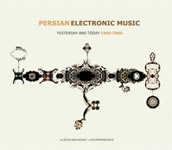|
|
 |
Dusted Reviews
Artist: Alireza Mashayekhi & Ata Ebtekar/Sote Album: Persian Electronic Music: Yesterday and Today 1966-2006 Label: Sub Rosa Review date: Feb. 29, 2008 |

|
|
|
 |
Electronic music is no longer accessible just to the few (academia, modern composers), and is now produced and consumed by the many (techno heads, noise artists, Radiohead fans). In the realm of obvious statements, this registers close to ‘water is wet.’ One consequence of this state of affairs is weariness over the idea of ‘what electronic music can be.’ But its inverse, an unengaged longing for things ‘as they were,’ is just as problematic. With research/reissue mania continuing apace, and the unearthing of early electronic music documents seemingly unstoppable, one question goes surprisingly unanswered: how critical is our engagement with electronic music’s history? Are we delving into the past with our analytical radar on standby?
The corollary of these excavations, however, can be illuminating. I’m not sure I need to hear any more fourth-tier French electroacoustics (though my music OCD still cries ‘keep it coming’), but exposure to work of the quality of Alireza Mashayekhi is always welcome. An Iranian composer, he relocated first to Vienna and then Utrecht, where he attended lectures by Gottfried Michael Koenig. In the more rigorously noisy pieces on the first disc of Persian Electronic Music, which is devoted solely to Mashayekhi’s works, I can hear the composer broach a similar interrogation of form as Koenig, whose electronic music often sounded like finely rendered yet brutishly handled chunks of asphalt noise.
Indeed, these are the more successful pieces on this disc. “Shur’s” negotiation of traditional music (played on violin) and noise swamps woozy melodies in warping tone-float; further into the set, things get rougher, with “Development 2” and “East-West” fantastically hard-nosed explorations of electronics, with sudden explosions of rough-housing circuitry and gruff stereo pans crackling through like extraterrestrial interference. These two pieces date from the early 1970s, a period that yielded Mashayekhi’s finest compositions. By the late 1970s, he’d located a relatively gentler tone, as evidenced on the dream-drifts of “Mithra” and “Yaad.” Here the instrumental sources, where applicable, are obscured less. They may be closer both to Mashayekhi’s ‘quest for meta X’ – his desire to contain simultaneity in his compositions – and to his desire to connect traditional and modern forms in ways that aren’t palliative or condescending, but they’re not quite as strong as the earlier pieces.
If that’s uncomfortably close to the position I adumbrated and criticised earlier – an electroacoustic take on ‘I like the old stuff better than the new stuff’ – Ata Ebtekar (a.k.a. Sote) problematizes things considerably. By creating music that seamlessly connects new electronics to traditional forms, while allowing both to retain their natural states of grace, Ebtekar reaches a point Mashayekhi spent years searching after. And while the latter’s music is, ultimately, more edifying, that’s not to belittle Ebtekar’s efforts. Sometimes his short studies are a bit obvious – the spooked mood of “Synthetic Overture (Satan’s Lullaby)” hews too closely to the gaseous synth tones that often ruined early 1990s ambient – but more often he nails a peculiar, no-place sound that’s genuinely uncanny. Opening “Miniature Tone” glistens as though tonnes of glitter are showering across a hyperactive slinky army; later, a traditional melody entwines with the electronics. “Micro Tuning” hits a similar mood, but the backdrop of ghost electronica keeps it in check before it blasts into a digi-fuzz coda; the ten-minute “Nashid” jumps through dark wormholes of messed-up noise.
Largely, though, it’s beautiful stuff that feels as pregnant with promise as Lithops and the A-Musik label did in the mid to late 1990s, or Coil’s Worship The Glitch slightly earlier that decade. Truly liminal electronics, paired with a past master of the form.
By Jon Dale
|







